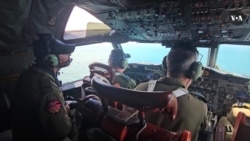How the U.S. and its allies are enforcing UN sanctions against North Korea.
Welcome to VOA Asia Weekly.
I'm Chris Casquejo in Washington.
That story is just ahead but first, making headlines:
U.S. Defense Secretary Lloyd Austin told reporters Wednesday there is evidence that North Korean soldiers are in Russia. South Korea's spy chief told lawmakers that North Korea has sent 1,500 more troops to Russia, doubling the total number to 3,000, and that they are now receiving training on drones and other equipment before being deployed to battlefields in Ukraine. Pyongyang denies this.
Russian leader Vladimir Putin greeted Chinese leader Xi Jinping on Tuesday at the opening of the BRICS summit. Putin called Xi his "dear friend" and said that growing cooperation between Moscow and Beijing was a stabilizing force for the world.
Junior doctors ended a 17-day hunger strike as part of a protest against the rape and murder of a colleague in the eastern Indian city of Kolkata, after an appeal from the victim’s family. Some strike participants suffered severe dehydration and had to go to the hospital. The woman doctor’s killing in early August sparked nationwide protests. A police volunteer was arrested for the crime.
Newly inaugurated Indonesian President Prabowo Subianto led the swearing-in of his cabinet ministers on Monday after announcing Indonesia's largest-ever Cabinet a day earlier. A total of 109 members represented his pledge for a strong government.
Polls in Japan suggest the ruling Liberal Democratic Party of new prime minister Shigeru Ishiba will lose seats in the lower house during general elections Sunday, perhaps even its majority – forcing it to share power. The LDP has ruled Japan for all but four of the past 65 years.
The United States and its allies are pressing ahead with efforts to enforce United Nations sanctions on North Korea, despite what they describe as a lack of cooperation from Russia and China. VOA’s Bill Gallo joined a Canadian military flight on the frontlines of those efforts, and reports from the East China Sea.
The Canadian Air Force is patrolling the waters off China’s coast. a hotspot for sanctions evasion.
This is where ships move oil to North Korea, defying U.N. Security Council resolutions.
This Canadian crew is part of a broader sanctions-enforcement effort by the U.S. and 10 of its allies.
Major Doug Publicover is the commander of the Canadian crew.
“Prevent some of the illegal ship-to-ship transfers which bring petroleum products into North Korea.”
When a suspicious ship is spotted, the crew flies low, gathering evidence that could lead to ships being de-flagged or seized. It's the kind of quiet operation that’s been happening for years.
“Most of the time, flights like this one occur without attracting big headlines. One country that is definitely noticing, though, is China.”
Soon after the mission begins, Chinese fighter jets appear, shadowing us for hours. These may be international waters, but we’re in China’s backyard.
It is a backyard U.S. officials say is not adequately monitored, allowing North Korea to exceed its U.N.-mandated energy caps every year.
China insists it is enforcing the sanctions, but also says they should be lifted.
Russia, too, has grown closer to North Korea, restoring a mutual defense agreement ...
… and vetoing the renewal of a U.N. panel that monitored sanctions enforcement on Pyongyang.
The U.S. and its allies tannounced a new body to replace the panel, but it won’t have U.N. support, raising questions about its effectiveness.
“There is no way that the U.S. and its allies on their own could enforce U.N. sanctions so long as China and Russia are not willing to go along with such a process. But nonetheless, it can be a very useful mechanism by which to name and shame.”
Doing that relies on these flights, which gather information that governments can then use to impose more sanctions.
How well it can work without help from China and Russia is another question. But for now, the U.S. and its allies are trying to uphold these U.N. sanctions alone.
Bill Gallo. VOA News. Over the East China Sea.
Visit voanews.com for the most up-to-date stories.
I’m Chris Casquejo.
Britain’s King Charles and Queen Camilla were treated to a showcase of traditional Samoan traditional culture, arts, and crafts.
Charles, the symbolic head of the Commonwealth, is visiting Samoa for the 75th Commonwealth Heads of Government Meeting.
More than half of the Commonwealth's members are small states, many of them Pacific Island nations facing the threat of rising sea levels caused by climate change.
The leaders are expected to make a declaration on protecting the ocean.
Thanks for watching VOA Asia Weekly.











